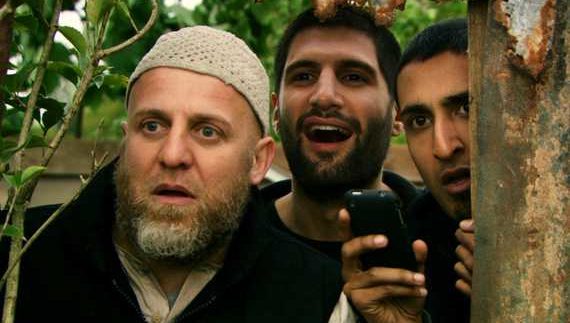-
Adeel AkhtarArsher Ali...
-
Comedy
-
Out now
-
Chris Morris
Haisam Abu-Samra

If laughter is the best medicine; then you can’t fault Four Lions, a British indie satire about
a group of indignant Muslims hell-bent on suicidal jihad. The film
pushes the limits of controversy, but handles the topic of fundamentalism
diligently without ever losing sight of its subjects’ humanity. In doing so,
the film walks the fine line separating thoughtful commentary from
inconsiderate offensiveness. You need to possess a good sense of humour and some tolerance to really enjoy this witty film.
Four Lions is set in
Sheffield, England, where a rogue group of young Muslim Pakistanis
decide to form their own terrorist cell. We use the word terrorist mostly
because all of their plans revolve around blowing things up and trying to join
Al Qaeda training camps.
The group itself is a bunch of incompetent men with heavy cockney
accents that border on mentally challenged. With the exception of Omar (Ahmed),
they could very well be the next Marx Brothers. The terrorists aren’t the only
ones who get ridiculed, though; almost no one is spared in Four Lions, from the oblivious neighbour
who fails to notice the glaringly obvious warning signs, to the London
police that end up committing foolish monstrosities; making them the butt of
the film’s biggest jokes.
What’s remarkable about Four Lions
is how it fully captures the look and mannerisms of its subjects. We’ve seen
depictions of Muslims in western films before, but they have never been as spot-on accurate as they are here. This is partially why the film resonates so well;
but it is also why the film is so unnerving. Director Morris spent more than
three years studying Islam and Middle Eastern culture; and he managed to
successfully tackle the delicate subject without pushing any buttons.
Four Lions is an audacious
film with a progressive agenda. It never makes fun of the subject matter, nor does
it treat it lightly; but rather it points the finger at bigotry and self-righteousness.
The comedy is always present at the film’s centre, but the film also touches on the dark tragedy underlining the matter.
Write your review
recommended
 Arts & Culture
Arts & Culture
Art Workshops in Cairo: 6 Art Spaces Offering Niche Artistic Workshops in Cairo
art workshops Cairo Activities +1 Arts & Culture
Arts & Culture
The Coptic Museum: The History of Egypt to the Tunes of Psalms of David
arts & culture cairo museums +4 Health & Fitness
Health & Fitness


